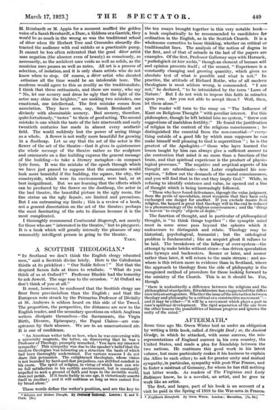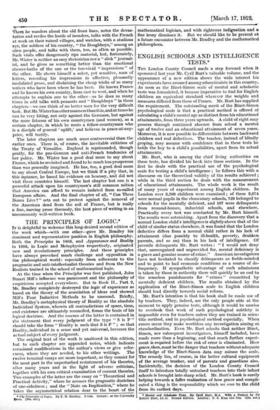AFTERMATH.*
SOME time ago Mr. Owen Wister laid us under an obligation by writing a little book, called A Straight Deal ; or, the Ancient Grudge, in which he attacked, with some success, the mis- representations of England current ill his own country, the United States, and made a plea for friendship between the two nations. He continues this good work in his latest volume, but more particularly makes it his business to explain the Allies to each other; to ask for greater unity and mutual sympathy, in particular, sympathy with post-War France, and to foster a mistrust of Germany, for whom he has still nothing but bitter words. As readers of The Virginian and Lady Baltimore know, he is a novelist, an artist, and he goes to work like an artist.
The first, and larger, part of his book is an account of a visit he paid in the Spring of 1919 to the War-area in France.
• Neighbours Henceforth. By Owen 'aster, London: Macmillan., [7s,
There he wanders about the old front lines, notes the devas- tation and reviles the horde of invaders, talks with the French at work on their ruined villages, and watches, with a studious eye, the soldiers of his country, " the Doughboys," among an alien people, and talks with them, too, as often as possible. Such visits offer dangerously ripe material, but, fortunately, Mr. Wister is neither an easy rhetorician nor a " slick " journal- ist, and he gives us something better than the emotional shower-baths of the one or the too-vivid " impressions " of the other. He shows himself a sober, yet sensitive, man of letters, recording his impressions in effective, pleasantly modulated prose, and disdaining the cheap tricks of so many writers who have been where he has been. He knows, France and he knows his own country, from cast to west, and when he attempts to explain one to the other—as he does so many times in odd talks with peasants and " Doughboys " in these chapters—we can think of no better man for the very difficult task. But Mr. Wister has other manners than this, and at times he can be very biting, not only against the Germans, but against the more fatuous of his own countrymen (and women), as a certain chapter, in which he routs a fellow-countryman who is a disciple of general uplift,' and believes in peace-at:any- price, will testify.
The later chapters are much more controversial than the earlier ones. There is, of course, the inevitable criticism of the Treaty of Versailles. England is reprimanded, though gently, for the pro-German and anti-French tendencies of her policy. Mr. Wister has a good deal more to say about France, which he revisited and found to be much less prosperous than was generally imagined. He has, too, a good deal more to say about Central Europe, but we think it a pity that, in this instance, he based his evidence on hearsay, and did not visit these countries himself. The last chapter but one is a powerful attack upon his countrymen's still common notion that America can afford to remain isolated from so-called European affairs. And the final chapter of all, " Can These Bones Live ?" sets out to protest against the removal of the American dead from the soil of France, but is really a fine, moving prose threnody, the best piece of writing in an uncommonly well-written book.











































 Previous page
Previous page